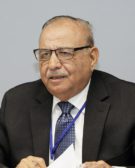On November 29, 2016, Arab Center Washington DC (ACW) hosted a talk by Dr. Abdulwahab Al-Qassab on the political Implications of the battle for Mosul. Dr. Al-Qassab provided historical context and analyzed the current political and military situation in Iraq, explaining the motivations of the multiple actors and the power dynamics that continue to influence the serious and volatile situation in Mosul.
With a diverse ethnic and religious population and overlaid with traditional tribal affinities, Iraq is now grappling with competing interests, and especially with the growth and entrenchment of ISIS. Al-Qassab explained that the political and expansionist aims of Iran in the region, and in the country, play a central role in Iraq’s stability. Inter-ethnic and Sunni-Shiite relations may have been generally nonbelligerent historically, but more recent political and sectarian issues and allegiances have fanned the flames of discord. He noted that the three major regional powers—Iraq, Iran, and the Gulf Cooperation Council—played a triangular power equation in the area until the US invasion of Iraq in 2003, which greatly diminished Iraq’s influence. Nonetheless, Iraq continues to be a strategic geopolitical entity in regional and international politics.
Mosul in particular represents a highly important stop on the traditional Silk Road. It links central Asia through Iran to the eastern Mediterranean and to the West, and toward central Iraq and the Arab Gulf to the south. To the north it links Iraq to Turkey and through the latter to Europe. Through the Caucuses, the axis is opened toward Russia and Eurasia. Economically it is a traditional center of trade, industry, and commerce.
Therefore, the 2014 ISIS takeover of Mosul -and – other Iraqi cities- represented a very important strategic gain for ISIS and a serious defeat to the Iraqi central government and its military forces. The potent ISIS control of Mosul continues to present profound challenges today for Iraq, Iran, Turkey, and the Kurds; indeed, many groups are fighting a proxy war in the city. Although the government now has control of Baghdad, Ramadi, Falluja, Tikrit, and Baiji, Mosul has proved more difficult to liberate.
Al-Qassab reiterated that the liberation of Mosul will be critical to the future of Iraq. The government, he advised, will have to behave in a “trans-national and trans-sectarian” way in order to guarantee the safety of every Iraqi citizen. Otherwise, he cautioned, the consequences would be drastic and could spell the inevitable dismemberment of the country into three regions—Sunni, Shiite, and Kurdish. The question therefore remains, he said: Will the Iraqi government act independently or will it be beholden to Iran?
Dr. Mustafa Gurbuz and Dr. Imad Harb, both non-resident analysts at ACW, also provided commentary discussing the implications of the Mosul battle for Turkey and the United States, respectively.
Gurbuz noted that increasing tensions in Mosul will have implications for Iraqi Kurdistan, where a new sectarianism could find its way and which would compel Turkey to become involved in a “sectarian game.” In addition, Turkey fears that Iran’s power is on the ascendant. He noted that the offensive against ISIS in Raqqa, Syria, cannot be separated from the battle for Mosul, and observed Washington’s wavering stance of supporting whichever side was successful in standing up to ISIS. It will be incumbent on President-elect Donald Trump’s administration to navigate effectively between President Erdogan and Kurdish forces, but Gurbuz wondered if this was realistic or even possible. Following the liberation of Mosul, he said, serious political leadership is needed to prevent further sectarian conflicts.
Harb started by saying that the battle for Mosul “means everything for the United States”—that Mosul is not only an Iraqi battle but a Syrian and American one as well. Washington must devote troops on the ground in order to vanquish ISIS; if Mosul is not handled correctly, the militant group will come back in a more brutal and dangerous form. He advocated that the United States initiate efforts toward nation-building in Iraq and to thinking strategically about how to reconstruct and rehabilitate Mosul with the best interest of Iraq in mind. He painted a dire picture of the current situation in the region, saying that the Arab state system in the Levant is in “free fall,” with two separate institutional power structures (government and Iran-backed) in Iraq, Syria, Yemen, and Lebanon, while Washington has been steadily losing its influence in the Middle East. He concluded his remarks by noting that after January 20, 2017, when President-elect Trump is inaugurated, “we don’t know what will happen” in terms of US policy.
While the battle for Mosul is far from over, the multiple political and military players make it difficult to predict the outcomes. One conclusion that can be deduced from the current realities on the ground is that only serious political leadership that treats all Iraqis as equal citizens can prevent a new sectarian crisis the day after Mosul is liberated from ISIS.
Dr. Abdulwahab Al-Qassab is an Associate Researcher at the Arab Center for Research and Policy Studies (ACRPS) in Doha, Qatar. Before entering a career in research and academia, Al-Qassab served in the Iraqi Armed Forces, earning the rank of Major General. He also served as a consultant for Naval Affairs and overlooked research and development programs for the Chief of the General Staff in the Iraqi Armed Forces. Between 1997 and 2005, Al-Qassab taught postgraduate strategic studies in Al-Nahrain University in Baghdad and in 2003 founded Al-Zaman Center for Strategic Studies in Iraq. From 2006 until 2010, he was a consultant to the Iraqi Center for Strategic Studies in Amman and the Center for Strategic Studies of the Qatar Armed Forces. Prior to joining ACRPS, Al-Qassab worked with the Center for Arab World Studies, Al-Mustansiriya University, and The Center for International Studies at University of Baghdad.

